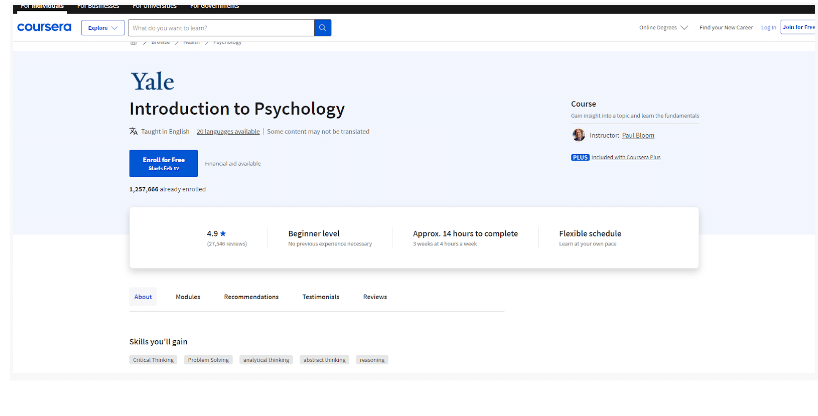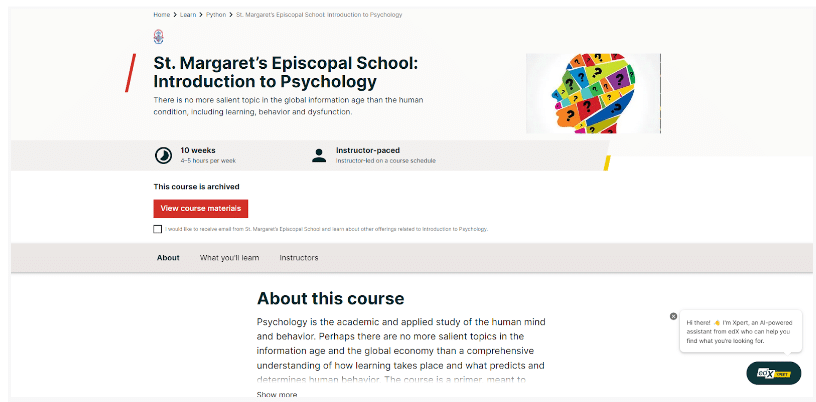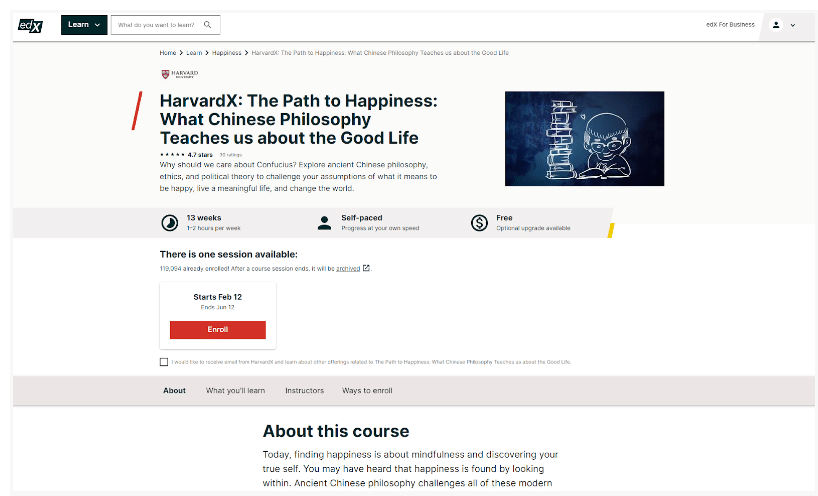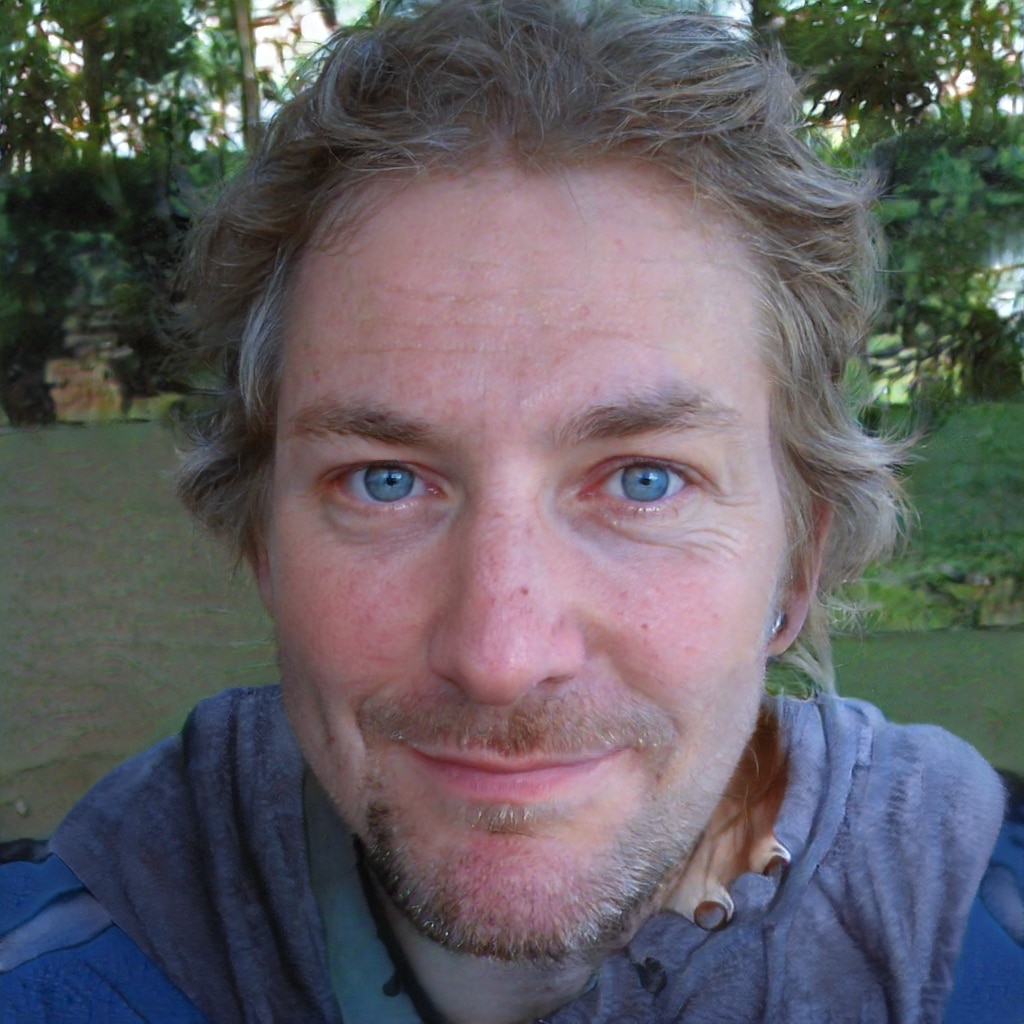The captivating science of psychology holds the key to unlocking these mysteries, and the Foundation of Psychology course offers a fascinating first step on your journey of discovery.
Whether you’re a curious individual seeking personal growth or an aspiring psychologist, this course lays a solid foundation for understanding the complexities of the human mind.
Delve into core principles like the mind-body connection, explore how our brains influence behavior, and gain insights into common mental health conditions.
Each week, you’ll embark on a modular adventure, delving into topics like the history of psychology, the biological underpinnings of behavior, and practical approaches to understanding and managing mental health.
Remember, this is just the beginning! This course is your springboard to further exploration, opening doors to diverse and exciting avenues in the vast world of psychology.
Overview: Foundation Of Psychology
This course is designed to introduce learners to the basic concepts and theories of psychology, the study of the mind and behavior. Ideal for beginners, students, and anyone interested in understanding human behavior, this course covers the fundamental aspects of psychology, including perception, emotion, learning, and personality. Through clear explanations, engaging examples, and practical applications, participants will gain insights into how psychological principles can be applied to everyday life.
Course Syllabus Preview:
Our course syllabus is structured to ensure a comprehensive understanding of the foundations of psychology, making it accessible and engaging for all learners. Here’s an overview of the major topics and their subtopics:
I. Introduction to Psychology
- What is Psychology?
- Brief History of Psychology
- Major Fields and Perspectives in Psychology
II. Research Methods in Psychology
- Types of Psychological Research
- Understanding Experiments, Observations, and Surveys
- Ethics in Psychological Research
III. Biological Bases of Behavior
- The Brain and Nervous System
- Genetics and Behavior
- Sensation and Perception
IV. Developmental Psychology
- Stages of Human Development
- Cognitive Development in Children
- Social and Emotional Development
V. Learning and Cognition
- Theories of Learning
- Memory and Information Processing
- Decision Making and Problem Solving
VI. Personality and Individual Differences
- Major Theories of Personality
- Assessing Personality
- Intelligence and Its Measurement
VII. Social Psychology
- Attitudes, Beliefs, and Behaviors
- Group Dynamics and Interpersonal Relationships
- Influence and Persuasion
VIII. Psychological Disorders and Treatment
- Types of Psychological Disorders
- Approaches to Treatment and Therapy
- Mental Health and Well-being
What You Will Learn
By joining this course, participants will gain:
- Foundational Knowledge: Understand the basic principles, theories, and fields of psychology.
- Research Skills: Learn about the methods psychologists use to study behavior and mental processes.
- Insight into Human Behavior: Gain insights into how and why people think, feel, and behave the way they do.
- Application to Everyday Life: Discover how psychological principles can be applied to improve personal and professional life.
- Awareness of Mental Health: Develop an understanding of psychological disorders and the importance of mental health.
This Course Includes:
- 15 Hours of On-Demand Video: Detailed video lectures that provide in-depth coverage of foundational psychology topics.
- 6 Comprehensive Articles: Supplementary reading materials to enhance your understanding of psychological concepts.
- 10 Downloadable Resources: Access to study guides, summaries, and practical exercises to support your learning.
- Mobile and TV Access: Study from anywhere, anytime, with lessons available on both mobile and TV.
- Certificate of Completion: Showcase your commitment to learning and your newfound knowledge in psychology.
Foundation of Psychology Courses Alternatives
The Foundations of Psychology course provides a valuable introduction to the field, but your journey of psychological exploration doesn’t have to end there! This list delves into exciting alternatives, opening doors to various facets of psychology and catering to diverse learning styles and interests.
1. Introduction Of Psychology By Yale University (Coursera):
| Course link | Here |
| Pricing | Free |
Journey through psychology’s history, exploring key thinkers and experiments that shaped our understanding of the mind and behavior. Free & Beginner-friendly.

- Strengths: Free and accessible, perfect for beginners seeking a historical perspective.
- Deeper Dive: Explore iconic figures and seminal experiments that shaped the field. Learn about philosophical debates like nature vs. nurture and mind-body dualism. Understand how psychology evolved from its philosophical roots into a scientific discipline.
- Ideal for: Those curious about the historical journey of psychology and its impact on our understanding of human behavior.
2. Introduction To Psychology (edX):
| Course link | Here |
| Pricing | Free |
Dive into the biological, cognitive, and social influences on human behavior. Analyze real-world case studies and engage in interactive exercises. Free & Comprehensive.

- Strengths: Free and comprehensive, covering the biological, cognitive, and social aspects of behavior.
- Deeper Dive: Delve into the brain’s role in behavior, uncover the secrets of learning and memory, and explore social influences on our thoughts and actions. Analyze real-world case studies and engage in interactive exercises to solidify your understanding.
- Ideal for: Individuals seeking a broad overview of core psychological principles and their practical applications.
3. Brain And Behavior (Walden University):
| Course link | Here |
| Pricing | $1750 |
Deeply explore major psychology areas with renowned Stanford professors. Expect cutting-edge research, diverse perspectives, and expert-led discussions. Fee-based & In-depth.

- Strengths: In-depth exploration of major psychology areas by renowned Stanford professors. Fee-based, indicating potential for more advanced content and rigor.
- Deeper Dive: Expect cutting-edge research, diverse perspectives, and opportunities to grapple with complex psychological concepts. Participate in discussions and activities guided by experts, gaining valuable insights into current psychological thinking.
- Ideal for: Students aiming for deeper understanding and seeking academic credentials to enhance their psychology pursuits.
4. Introduction To Psychology (Harvard University on edX):
| Course link | Here |
| Pricing | Free |
Build a strong foundation in psychology with Harvard’s experts. Explore classic and contemporary research, engage in thought-provoking discussions, and earn prestigious credentials. Fee-based & Prestigious.

- Strengths: Prestigious institution offering a foundational psychology course. Fee-based, similar to other university courses.
- Deeper Dive: Expect high-quality content and potentially unique insights from Harvard’s psychology department. Explore classic and contemporary research, engage in thought-provoking discussions, and gain a solid foundation in core psychological concepts.
- Ideal for: Individuals seeking a well-respected introduction to psychological courses.
Conclusion
The Foundation of Psychology course has ignited a spark of curiosity within you, opening doors to a deeper understanding of yourself and the world around you.
But your journey doesn’t end here! This blog explores a vibrant spectrum of alternative courses, each catering to unique interests and learning styles.
Whether you’re drawn to the historical roots of psychology with Coursera’s “Foundations of Psychology,” captivated by the interplay of biology and behavior in edX’s “Introduction to Psychology,” or yearn for in-depth exploration with renowned professors at Stanford or Harvard, there’s a course perfectly suited to you.
So, take a deep breath, embrace the excitement of intellectual discovery, and delve into the captivating world of psychology beyond the foundations.
Remember, with every new insight, you gain a deeper understanding of the intricate tapestry of the human mind and behavior. Your psychological odyssey awaits – embark on it today!
Article By

